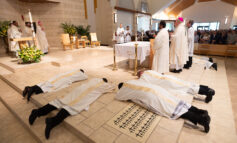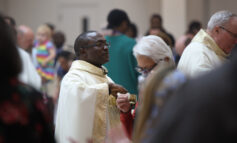By Father Thomas Esposito, O. Cist.
Special to The Texas Catholic
I was deeply impressed by the answer a fellow priest gave recently to a question that I ponder frequently. When asked to name one unifying cause for the troubles that plague us as American Catholics, he simply said, “I think we try to avoid suffering at any cost.”
There is certainly biblical precedent to support his claim. Saint Peter expresses the universal and natural abhorrence of suffering when he forbids Jesus to suffer and die in Jerusalem. Jesus rebukes Peter by declaring him a satan — not the architect of evil himself but literally an adversary or opponent, someone who lays down a skandalon, an obstacle or stumbling block, to prevent Him from journeying down the path of suffering that leads to the fulfillment of the Father’s will (see Matthew 16:21-23).
Distraction and a basic selfishness in gratifying any possible desire immediately are the norm for our daily lives; any lack of physical comfort, hint of mental anguish, or minor deprivation becomes an annoyance to be eliminated. On the physical level, this is understandable and even laudable; technological and medical advancements have yielded amazing benefits and “creature comforts.” Yet, the immediate satisfaction of all physical or emotional needs quickly leads to a deadening of the spiritual sense, and it can produce a quiet disdain for the cross of Christ and the obligation to carry one’s own. Implicit in the logic of the cross is the admission that the Lord’s will is greater than one’s own. It is a will that does not flee from suffering, but rather transforms it and teaches us how to do likewise with our own inevitable suffering if we live by that logic. The refusal to live according to that cruciform logic and to prefer our own solutions of ease, comfort, and ignorance of suffering is the great and alluring temptation that we face daily.
For St. John Henry Newman, the measure of the world is not the selfish will of any one person; it is, rather, the cross of Christ, the timbers of which create the axis upon which the world truly turns if it is to be sanctified at all. The passion and death of our Lord, which we will soon celebrate, have “brought together and made consistent all that seemed discordant and aimless. It has taught us how to live, how to use this world, what to expect, what to desire, what to hope. It is the tone into which all the strains of this world’s music are ultimately to be resolved […] Thus in the cross, and Him who hung upon it, all things meet; all things subserve it, all things need it. It is their centre and their interpretation. For He was lifted up on it, that He might draw all men and all things unto Him.”
Christians, of course, often hear the accusation that the logic of the cross leads to dour and pleasure-denying lives. From the vantage point of the cross, however, the diagnosis of the human malady is the same as much worldly wisdom: Pagan philosophers then and now highlight the vanity and even absurdity of all things done without ultimate meaning under the sun. The difference lies in the far more beautiful prognosis for humanity offered by Christ thanks to the suffering He willingly confronted, endured, and alleviated for us: “It is a superficial view of things to say that this life is made for pleasure and happiness. To those who look under the surface, it tells a very different tale. The doctrine of the cross does but teach, though infinitely more forcibly, still after all it does but teach the very same lesson which this world teaches to those who live long in it, who have much experience in it, who know it. The world is sweet to the lips, but bitter to the taste. It pleases at first, but not at last.”
This truth is usually hidden quietly within the hearts of believers, yet it animates their lives with a quiet but radiant joy that the selfish seeker of pleasures can never know. The doctrine of the cross, Newman concludes, “only forbids us to begin with enjoyment. It only says, If you begin with pleasure, you will end with pain. It bids us begin with the cross of Christ, and in that cross we shall at first find sorrow, but in a while peace and comfort will rise out of that sorrow.”
Father Thomas Esposito, O. Cist., is a monk at the Cistercian Abbey of Our Lady of Dallas and teaches in the theology department at the University of Dallas.



